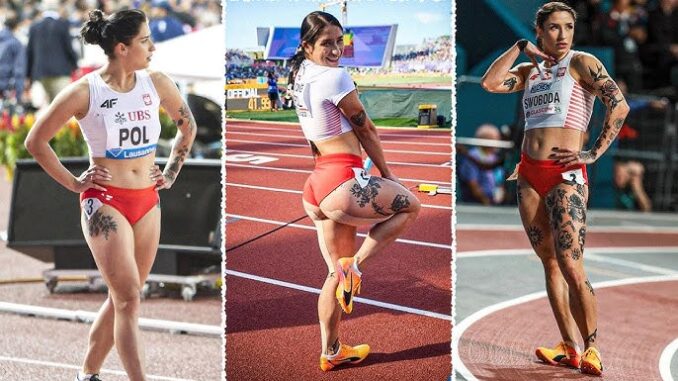
When the world gathers to witness the relay, it’s never just another race. It’s a drama of motion, muscle, and mentality — a poetic battle fought in split seconds. Two nations line up, each with four athletes ready to carry not only the baton but the weight of their flag, their people, and the years of preparation that brought them to this moment. Eight bodies, one heartbeat per team. The stadium holds its breath, and when the starter’s pistol cracks, the air explodes with purpose.
From the first leg, the test begins — not only of speed but of strategy. The opening runners thunder down their lanes, carving arcs of determination into the track. Their job is to set the tone, to establish rhythm and belief. The baton glimmers in their hands, light yet heavy with responsibility. In that instant, it’s no longer wood or metal; it’s history in motion, passed down through sweat and sacrifice.
Then comes the first exchange — that fleeting, heart-stopping moment that defines triumph or disaster. Trust must be absolute. The outgoing runner accelerates without looking back, arm outstretched, waiting for that familiar slap of connection. One misstep, one hesitation, and the dream shatters. But when it works — when timing, training, and intuition align — it’s like witnessing choreography perfected by destiny itself.
The middle legs demand something deeper — endurance, composure, and unyielding belief. These are the unsung heroes, the ones who hold the race together when fatigue creeps in and doubt whispers. Their job isn’t only to maintain pace but to keep the flame alive, to preserve momentum for the final charge. Each stride echoes with the voices of coaches, teammates, and fans who have believed in this moment since day one.
And then, the anchor. The crowd rises as the final runners take the baton — the symbol of everything their team stands for. Pride meets pressure. Adrenaline collides with exhaustion. It’s no longer about running; it’s about surviving, about finding that last ounce of will when the lungs scream and the legs beg for mercy. The finish line draws near, but in those last meters, time slows. It’s not just a contest of speed anymore — it’s a test of heart, of who refuses to yield, who dares to endure the pain a second longer.
When the baton crosses the line, victory is more than just a medal. It’s the culmination of trust, sacrifice, and unity. Win or lose, every runner has left a piece of themselves on that track. Two nations. Eight runners. One brutal test — not of who runs the fastest, but of who believes the most. In the end, the baton tells the story — of courage shared, of limits broken, and of legacy earned in the purest language of sport: endurance
and pride.
Be the first to comment